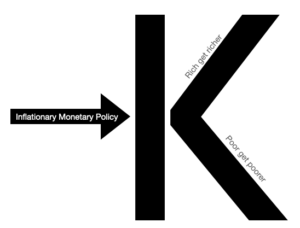
Although the House rejected the recent $700 billion bailout, there is plenty of bailing out that has already happened, and there is more to come. Already:
- $80 billion injected into failed AIG
- IndyMac bank taken over by FDIC
- Bank of America bought Merrill Lynch for $50 billion – 70% over its September 12 closing price
- Bear Sterns was bought by JP Morgan Chase for $1.2 billion and the Fed then loaned JP Morgan Chase $29 billion (without recourse) to ensure that JP Morgan Chase didn’t actually have to suffer the consequences of buying a failed bank
- Washington Mutual failed – it is the largest bank failure in American history. In 2007, its share price was $45. By the time it was sold to JP Morgan Chase, it’s share price was 16 cents. The CEO stepped down on September 8, 2008 and a new CEO received a $7.5 million sign-on bonus. 17 days later, he received an $11.6 million severance package as WAMU filed for bankruptcy.
- Bank of America has become the nation’s largest mortgage lender by purchasing Countrywide & Interfirst
Hundreds of billions of dollars have already been injected into the system as seen on this timeline. It’s been happening every couple of months – 5, 10, or 20 billion dollars at a time. That kind of help hasn’t helped enough, and the $700 billion bailout is a sign that zeros will soon be added to the bailouts, and they will total in the trillions of dollars.
What happens to a company that gets bailed out?
- It becomes either under the control of whoever provided the money; and/or
- It becomes indebted to whoever provided the money.
How will our government pay for this?
Firstly, it’s important to understand that the government doesn’t have any money. Its liabilities outweigh its assets. Its future liabilities outweigh its future income. It constantly borrows money from Fed (a private bank) and others. The government spends the money of others. Because its liabilities outweigh its income and assets, when it decides to spend money it is actually deciding to spend somebody else’s money.
Whose money is the government spending?
There are only 3 options of who will ultimately put up the money that is now being spent by the government:
- Taxpayers (through taxes) – If taxes are the only way the government increases its income, then we will likely end up with the highest taxes in the world.
- Taxpayers (through inflation) – The Fed also doesn’t have money, but it creates it out of thin air. So every dollar that the Fed gives to the government or any bank is a dollar that didn’t exist until they gave it. This creates money, and an increasing money supply is what causes inflation. The effect of inflation on citizens is an invisible tax. Every year it costs more to buy goods and services because there are more dollars in the system. The more rapidly money is digitally printed, the more rapidly our dollar loses its purchasing power. The Fed has obviously been printing a lot of money in the past few years (as evidenced by double digit inflation) and they would have to print exponentially more to level out this mess. Printing lots of money essentially takes the value of money owned by citizens (who had to earn their money) and gives it to the government and banks. Inflation is already high, and if it were to double it would probably result in an abrupt nationwide economic collapse involving a loss of more jobs, homes, and money than in the Great Depression.
- Other governments – The financial spending of our government has gotten so out of hand, it may not be able to be put on the backs of our country’s citizens alone. As the problems increase, expect to see propositions for merging or annexing of countries and/or a move toward a one-world government; this would allow our financial problems to be put onto the backs of a global population instead of ours alone.
Would merging of countries be a good thing?
No. The idea behind the founding of the USA is that power would be distributed among local governments. The more centralized the power is, the more corrupt it it can become.
Example 1 – Lobbying
Bob is lobbying for a large corporation who wants to get a law passed that will help his corporation and hurt citizens. It would be very difficult for him to succeed in this endeavor with local governments. He would have to go to the expense (time and money) to go to every city and state government to pass his harmful law. When he gets to each local government office, the government official would say “I can’t do what you’re asking of me. I live in this community, and the citizens would kill me.” This equals failure for Bob’s lobbying and success for a people’s government.
To the contrary, today’s evolved, unconstitutional government is taking place mostly centrally and federally in Washington, D.C. So if Bob wants to pass his harmful law, he can just convince (pay) a politician in D.C. to pass it. Not only will this politician not be hanged by his constituents; they won’t even know the law is passed. This corruption will increase the more centralized power becomes. If nations merge, corruption will amplify.
Example 2 – Other types of corruption
If nations merge, everything must go digital in order for government offices of [formerly] different countries to be able to integrate their systems and records. We will be required to have nationalized identification cards. All of our money will be digital. Voting will be entirely digital. Criminal records will be digital. Medical records will be digital.
Let’s say Jack and Jill are married, but they begin to hate each other. Jack has a friend in the central government, and he can have that person update all of Jill’s digital info to criminalize her or even erase her identity or money. Think of the movie The Net. It sounds silly, but most major world events can sound silly up until the moment they occur. In this scenario, “connected” people will exercise control over regular people. Essentially, it would be the largest mafia ever, and it would be legalized. I hope I’m wrong.
Conclusion
Think about things logically. The government is in a financial mess. It is somehow saving banks and financial service companies that are in a financial mess. Somebody has to pay for it. The more this extreme spending continues, the more extreme the options will be on how to stablize it.
Don’t let this continue. Do something about it.
### Update 10/10/2008
The idea that the weakening of economies and countries is a purposeful action aimed towards merging powers to become globally centralized is supported by a Bloomberg article today. In the article Italian Prime Minister Silvio Berlusconi explains that world leaders are considering closing world markets in order to rewrite their rules to solve the financial crisis globaly rather that for just one country. Go back up a few paragraphs into my original post and reread Would merging of countries be a good thing?


